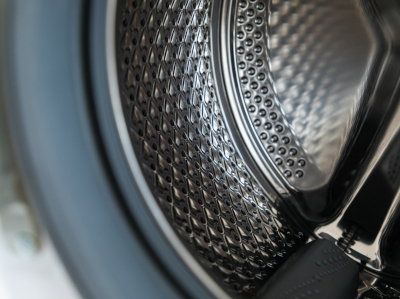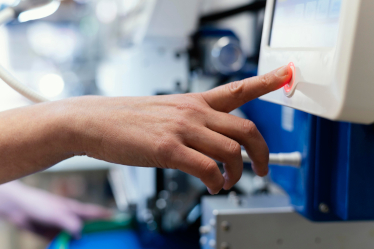‘Nice, but not for me.’
Really?


The New Product Showcase is filled with photos of shiny machines that have great features. You may have glanced at it and said, “Some day. Nice machines, but I’m not interested right now.”
Your machines are still running so why would you even think about replacing them? Most people avoid buying a new machine. Whether it’s a press, a washer or a boiler; it’s a big bill. Plus, it’s a lot of work. Most people put it off as long as they can. Who needs to keep up with the times, right?
Look in your pocket. How old is your cellphone? The old one was still working, so why do you have the latest model? Because it has newer features. You can do email, texting, order supper, see where your kids are, watch your staff working, buy a latte and even make phone calls.
The cellphone companies added features that you can’t live without and made it easy for you to upgrade to a new phone every couple of years. Your cellphone may be two years old, but your dry cleaning machine is 22 years old. Your cellphone is a toy; that dry cleaning machine makes you money every day.

Why buy a New Machine?
I have listed the benefits of newer equipment many times. Suffice it to say that today’s equipment will save labour dollars, improve process control, free your staff from tedious jobs and allow you to manage your business better.
Saving on labour due to more efficient machines is one thing. More important, you may be able to hire less skilled help. Our workforce is aging out and young people today aren’t interested in learning the skills to do this work. Automation saves time and frees your people from menial tasks. It’s also reliable. An automatic bagger shows up for work every day and usually doesn’t give you attitude.
Garments have changed. So have customers and their demands. Does your POS text customers to say their order is ready? You have to deliver what your customers want. That old equipment may be holding your business back
Who pays?
Dry cleaners are not good at planning for equipment purchases. And they are even worse at saving money for new equipment. How will you pay for that new machine?
My question is not whether you can write the cheque, but have you calculated the financial implications of that purchase. You don’t pay for that machine – your customers and staff pay for it.
Will it allow you to handle more work? Will it bring in new work that you hadn’t previously been able to do? Will it save you money on wages? Will it reduce your maintenance costs? Is there a savings in utilities? That is where the money has to come from. When you do those calculations it becomes easier to make the purchase.
Having said that, you still have to write the cheque. The best option would be that you have been putting money aside in anticipation of this equipment purchase. Maybe you should bank the money your accountant claims as depreciation so you are ready when you have to buy something.
Getting a loan from a bank can be slow. They demand excessive amounts of paperwork and they usually only lend you money when you don’t need it.
The other alternative is an equipment lease. This type of lease holds the equipment as security. You contract to make X number of payments, then at the end of that term the equipment is yours. Yes, they charge a higher interest rate than the bank, but they allow you to pay for the machine as you use it. For up to $100,000, it’s a one-page form and they don’t even ask for statements. You are approved in hours – not months. An equipment lease allows you to get the equipment you need today. They also include the installation, solvent, etc.

Homework first
There are many different models of machines available. It’s a lot of work deciding what is best for you. Which machine will suit your needs? Who will you buy the machine from and who will install it? Where will it fit in the plant? Do you have the required utilities? How will it affect your work flow? Who will do the training? When is the best time to install it?
Most often equipment is purchased when there is a major breakdown. It’s an emergency purchase. You buy whatever is available immediately – whether it fits your needs or not.
Plan ahead and make the most of your purchase. Make the process as easy as possible for you and your staff. Yes, you may be getting rid of a machine that is still working, but look at what you are gaining.
Better plants have good machines – which comes first?
We have been selling equipment for over 20 years and I have never had anyone say, “I wish I hadn’t bought this machine.” Usually the comment is, “I wish I had bought it sooner.”
We have been in many plants all over Western Canada. Without fail, the plants that are doing well have newer equipment. Most people assume that because they are doing well they can afford new equipment. I think it’s the opposite.
They are doing well because they have invested in newer equipment. If you have nicer machines, you can get the better employees. Your crew is happier working with good equipment and they do a better job. You have fewer breakdown issues, so you can focus on other areas of your business.
Sure it’s a stretch to make those lease payments, but it forces you to develop your business.
You can lean on the counter and whine that business is slow, or you can move out of your comfort zone and make things happen. It’s up to you.

Kevin and Paula Marois founded Calgary-based Integrity Mechanical in 2003 to service plants in western Canada. He writes on issues related to equipment, its purchase, maintenance and use. You can reach Kevin at office@imicanada.ca or via his website www.imicanada.ca







